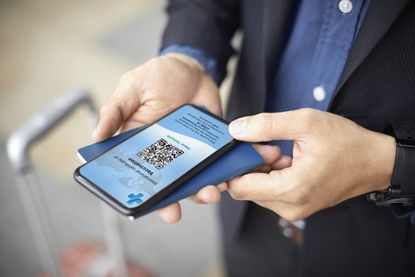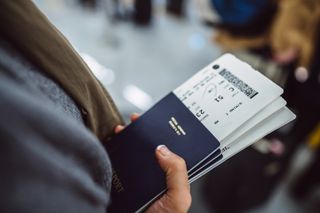How to prove your double Covid vaccination for travel


As the coronavirus pandemic continues, anyone looking to get away this year will likely have to get proof of their Covid vaccine for travel.
While some countries on the government's green and amber lists only request a negative PCR test, there is a growing list of countries around the world who are requesting that UK travellers show proof of both vaccinations - or enter a 14-day quarantine on arrival. Malta and Portugal, two popular holiday destinations for Brits, are the latest countries to put themselves on this list.
It comes amid fears of the new Delta variant and its increased transmissibility, as cases have skyrocketed in the UK over the last month. So whether you're planning to travel for essential reasons or a holiday, this is what you need to know about proving your vaccination status - and the countries where you'll need this vaccine passport.
How to get proof of your double Covid vaccination for travel
The verified way to show proof of your double Covid vaccination status is through the NHS Covid Pass.
You can request one on the NHS website or through the NHS app. This is different to the NHS Covid-19 app, which you use to check into venues as part of the government's Track and Trace scheme. To use this app, you have to be registered with a GP surgery and create a login using your NHS number, which you can request a reminder of online.

Once you're logged into this app, you can press the "Get your NHS Covid Pass" button. Press "travel" and the app takes you to a screen that contains all the details of your Covid-19 vaccinations. Press "show details" and a QR code will pop up. This is officially your Covid-19 vaccination status, as officials in other countries will be able to scan the code to verify your complete vaccination status.
It expires after 30 days so to get another one, you just need to log back into the app. Currently, the only approved vaccines for use in the UK are the Pfizer, Moderna and Oxford jabs.
GoodtoKnow Newsletter
Parenting advice, hot topics, best buys and family finance tips delivered straight to your inbox.
Can you get a letter proving you've had your COVID-19 vaccine for travel abroad?
If you don't have access to the app, you can also apply for an NHS Covid Pass letter via the website.
This letter shows your coronavirus vaccination status and you can use it if you're travelling abroad, going to an event that requires a full set of vaccinations or for anything else that needs proof of a double vaccination.
This also only applies to those living in England. In Scotland, to access proof of your Covid-19 vaccination you must request a paper copy of your vaccine status via the NHS inform website. You can also call 0808 196 8565 to make the request.
In Wales, there is no system to offer a digital pass for vaccination status. To request a paper one, call 0300 303 5667, but only a minimum of five days after your second dose.
However in Northern Ireland, authorities are still making progress on the paper Covid pass. This is likely to be available in July and digital passes may be available later in the year.
Those eligible to book a booster jab will also be able to show a triple vaccination through this system.
Which countries require double vaccinations to enter?
There are some countries, such as France, that are only allowing in people from the UK who are double vaccinated. However, many of these will also accept proof of a negative PCR test taken a maximum of 72 hours before.
- Portugal: All UK arrivals must have proof of double vaccination or enter 14-day quarantine.
- Ireland: All arrivals must show double vaccination status or proof of a negative test.
- Spain: UK travellers must provide proof of double vaccination or proof of a negative PCR test.
- France: All UK arrivals must have proof of double vaccination AND proof of a negative PCR test on arrival.
- Greece: UK travellers must show proof of two vaccine doses, antibodies from previous infection or a valid negative test.
- Cyprus: Anyone coming into the country must be able to show full proof of double vaccination or quarantine.
- Israel: Travellers must have proof of two vaccine doses. Or they can provide a negative PCR before flight and another test on arrival to prove complete vaccination status.
- Estonia: Travellers must prove double vaccination status or presence of antibodies from previous infection.
- The Seychelles: Visitors must prove complete vaccination status and provide a negative PCR test within 72 hours.
- Romania: All arrivals must be able to show proof of double vaccination status or quarantine on arrival.
- Georgia: All travellers must be able to show proof of double vaccination status or quarantine on arrival.
- Poland: Anyone entering the country must prove full vaccination status or quarantine for 10 days on arrival.
Iceland will also join this list in the near future. Currently, UK travellers wanting to go to Iceland must take a test and quarantine on arrival. But sometime soon, proof of both doses of the Covid vaccine will be suitable for travel.
When visiting any of these countries, many of which are on the government's amber list and require a quarantine period on return, it's important to check restrictions on coming back to the UK. Amid rising coronavirus cases, there are concerns over a circuit breaker lockdown and extended restrictions before the end of the year.
This would likely change the travel rules once again.

Grace Walsh is a health and wellbeing writer, working across the subjects of family, relationships, and LGBT topics, as well as sleep and mental health. A digital journalist with over six years experience as a writer and editor for UK publications, Grace is currently Health Editor for womanandhome.com and has also worked with Cosmopolitan, Red, The i Paper, GoodtoKnow, and more. After graduating from the University of Warwick, she started her career writing about the complexities of sex and relationships, before combining personal hobbies with professional and writing about fitness.
-
 I tested the Lakeland Dual Basket air fryer and it made midweek family cooking a breeze
I tested the Lakeland Dual Basket air fryer and it made midweek family cooking a breezeYou can’t go wrong with the dual basket air fryer by Lakeland complete with easy-view windows to ensure burnt food is a thing of the past…
By Jessica Dady Published
-
 Reframing one simple habit could get your sex life back on track after having a baby, new research shows
Reframing one simple habit could get your sex life back on track after having a baby, new research showsMany parents struggle to get their sex life back on track after having a baby, but new research has shown how one simple habit could make all the difference.
By Ellie Hutchings Published